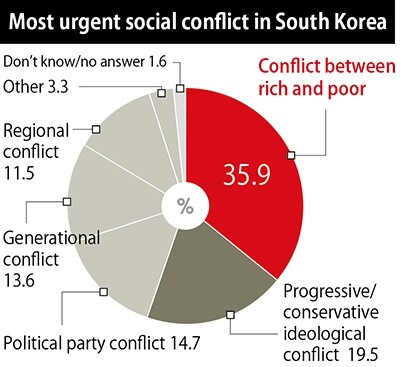hankyoreh
Links to other country sites 다른 나라 사이트 링크
Survey: resolving class conflict the most urgent task facing new government

In a new survey, South Koreans identified conflict between the rich and poor as the most urgent task that the administration of president Moon Jae-in must address to achieve social unity. An overwhelming percentage of survey respondents said that the new government should build a “medium burden, medium welfare” society, in which the state covers a number of risks in exchange for paying higher taxes. This basically confirms public support for the government taking action to redress the wealth gap and to use higher taxes to fund a welfare state.
On May 14, Hankook Research published the results of a poll that it carried out on May 12 and 13, commissioned by the Hankyoreh, to mark the 29th anniversary of the newspaper’s establishment. When 1,000 adults from around South Korea were asked about the area in which conflict most needs to be resolved to unify South Korean society, 35.9% of respondents chose “conflict between the rich and poor.” Other responses were “ideological conflict” (19.5%), “inter-party conflict” (14.7%), “generational conflict” (13.6%) and “regional conflict” (11.5%).
Strong support for prioritizing a resolution to the conflict between the rich and poor was found across different generations and classes. By age group, this view received the most support from people in their twenties (43%) and thirties (43.6%); by region, from those living in Seoul (42.1%); by voting preference in this year’s presidential election, from those who voted for left-wing Justice Party candidate Shim Sang-jung (54.7%); and by average monthly income, from those who earn between 5 and 7 million won a month (US$4,400-6,200; 41.1%). But among those who are 60 years old and above, more respondents placed a greater priority on resolving ideological conflict (24.9%) than on the conflict between the rich and poor (23.7%). Those who voted for Liberty Korea Party candidate Hong Joon-pyo also took ideological conflict (30.9%) more seriously than the conflict between the rich and poor (23.1%).
When asked about the type of society that the next government should establish, an overwhelming majority of respondents (70.5%) identified a “medium burden, medium welfare” society - “a society in which the state uses social insurance and other means to take responsibility for various risks, even if that means paying higher taxes.” Only 24.1% of respondents selected a “low burden, low welfare” society - “a society in which individuals pay lower taxes but bear more of the responsibility for risks” - while 5.4% of respondents did not answer.
“All policies designed to resolve inequality require a large amount of funding. The administration needs to lay out a specific implementation plan and funding measures and seek public consensus as soon as possible during its honeymoon period while it has strong support from the public,” recommended Kim Jin-seok, a professor of social welfare at Seoul Women’s University.
“If we’re going to resolve the fundamental issues of our society, we need to have a forward-looking plan about raising taxes,” said Yoon Hong-sik, a professor of social welfare at Inha University.
The survey found that South Koreans’ number-one priority for reform is the Prosecutors (31%), with the second priority being the political system (21.3%). Reforming the Prosecutors received the most support from those in their twenties and forties and from those with at least a high school education, while reforming the political system received more support from the middle aged (in their fifties and older) and those with no more than a middle school education. The ranking for other types of reform was the chaebol (12.7%), the media (11.8%), education (9.8%) and bureaucracy (8.3%).
This survey was carried out through random dialing of landlines and mobile phones, with a reliability of 95% and a ±3.1%margin of error.
By Park Ki-yong, staff reporter
Please direct questions or comments to [english@hani.co.kr]

Editorial・opinion
![[Column] Has Korea, too, crossed the Rubicon on China? [Column] Has Korea, too, crossed the Rubicon on China?](https://flexible.img.hani.co.kr/flexible/normal/500/300/imgdb/original/2024/0419/9317135153409185.jpg) [Column] Has Korea, too, crossed the Rubicon on China?
[Column] Has Korea, too, crossed the Rubicon on China?![[Correspondent’s column] In Japan’s alliance with US, echoes of its past alliances with UK [Correspondent’s column] In Japan’s alliance with US, echoes of its past alliances with UK](https://flexible.img.hani.co.kr/flexible/normal/500/300/imgdb/original/2024/0419/2317135166563519.jpg) [Correspondent’s column] In Japan’s alliance with US, echoes of its past alliances with UK
[Correspondent’s column] In Japan’s alliance with US, echoes of its past alliances with UK- [Editorial] Does Yoon think the Korean public is wrong?
- [Editorial] As it bolsters its alliance with US, Japan must be accountable for past
- [Guest essay] Amending the Constitution is Yoon’s key to leaving office in public’s good graces
- [Editorial] 10 years on, lessons of Sewol tragedy must never be forgotten
- [Column] A death blow to Korea’s prosecutor politics
- [Correspondent’s column] The US and the end of Japanese pacifism
- [Guest essay] How Korea turned its trainee doctors into monsters
- [Guest essay] As someone who helped forge Seoul-Moscow ties, their status today troubles me
Most viewed articles
- 1[Column] The clock is ticking for Korea’s first lady
- 2Samsung barricades office as unionized workers strike for better conditions
- 3S. Korea, Japan reaffirm commitment to strengthening trilateral ties with US
- 4[News analysis] After elections, prosecutorial reform will likely make legislative agenda
- 5[Editorial] When the choice is kids or career, Korea will never overcome birth rate woes
- 6Japan officially says compensation of Korean forced laborers isn’t its responsibility
- 7[Editorial] As it bolsters its alliance with US, Japan must be accountable for past
- 8Why Israel isn’t hitting Iran with immediate retaliation
- 9[Column] Has Korea, too, crossed the Rubicon on China?
- 10All eyes on Xiaomi after it pulls off EV that Apple couldn’t